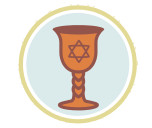
Each year at Passover, Jews read this line in the haggadah, "In every generation a person is obligated to see themselves as if they had left Egypt." Why? Because each of us should understand that in our generation, just as in our ancestors' generation, the status quo is not inevitable. Societies founded on inequality, on domination of others, on ruling those who do not wish to be ruled cannot, in the arc of history, last. In every generation there is a wrong to be righted. Today, it is in our hands to right it.
This year, you can add flavor to your seder by sharing this thoughtful reflection by Rabbi Toba Spitzer. Rabbi Spitzer, who is the recipient of Americans for Peace Now’s 2015 Elizabeth Wyner Mark Peace Award, has graciously contributed our 14th haggadah insert. In it, she reminds us of the costs for freedom, and asks us to make an honest reckoning, an acknowledgment, and perhaps a commitment to make some kind of repair to those who are affected by the privileges we enjoy.
Since 2001, Americans for Peace Now has asked rabbis from the extended APN family to contribute reflections on the haggadah: that story which has for centuries been understood as the archetype of liberation. Many of us have made these reflections a permanent part of our seder - we hope you will, too. You can find them here.
May we all enjoy a sweet and liberating Passover,

Debra DeLee
President and CEO,
Americans for Peace Now
Submitted by Rabbi Toba Spitzer (2015)
Rabbi Spitzer is recipient of Americans for Peace Now’s 2015 Elizabeth Wyner Mark Peace Award
To be read just before the recitation of the ten plagues.
 When it comes time to recite the ten plagues, there is a tradition of dipping a bit of
wine out of our cups as we say each plague, diminishing our joy just a bit as we recall the difficulties
that befell the Egyptians.
When it comes time to recite the ten plagues, there is a tradition of dipping a bit of
wine out of our cups as we say each plague, diminishing our joy just a bit as we recall the difficulties
that befell the Egyptians.
This seder tradition calls to mind a famous midrash (rabbinic commentary), on the moment during the Exodus when the Egyptian army was drowning in the sea, just after the Israelites crossed to freedom. The angels turned to one another to sing their daily praises, when God hushed them, saying, "The work of My hands is drowning in the sea, and you would sing songs before Me?!"
While we cannot erase the suffering of the Egyptians from our freedom story, we can acknowledge that a human price was paid. As we recite the plagues, as we drop a bit of wine onto our plates, we are invited to remember that our own freedom--as Americans, as Jews--often comes with a price paid by others. We can take this moment to reflect on the damage done, whether intentional or not, that has allowed us to enjoy our freedom and our privilege.
If I am economically privileged, what is the cost borne by others--in the U.S. and around the world--to allow me my comforts? If I am white, at what cost comes the relative ease with which I move through the world? As a Jew, as someone connected to Israel, how do I reckon with the terrible price paid by the Palestinian people for the creation of the Jewish state? This is not a moment for guilt, but for honest reckoning, for acknowledgment, and perhaps a commitment to make some kind of tikkun, repair, during this season of redemption.
Click here to see all the haggadah inserts from previous years.